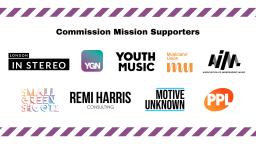
...don’t expect success to be easy. It might take years for an artist to reach the kind of success that brings in a steady income for you both - it might never happen at all, so passion is vital.
Written by Tina Edwards - as part of Commission Mission.
Behind every great artist is a great manager. Maybe, for an independent musician, that manager is ‘within’. Maybe, for others, that artist could be managed by you.
Some roles in the music industry - like live music programming or sound engineering - have a fairly clear route of entry if you do the research, but how do you become an artist manager? Though there’s plenty of resources online - check out Music Managers Forum, Council Music Makers and the European Music Managers Alliance - there’s no clear path.
A lot of managers cut their teeth in other roles, while building their knowledge and contact base. With social media unlocking direct access to both industry professionals and fans, we’ve never been better equipped to research the industry, find new music, and build a black book of our own.
A good manager will make sure that projects - like single campaigns - run smoothly, and will have a vision for both the short term and long term success of their artist. Whilst there’s lots of managers out there who make a big buck, don’t expect success to be easy. It might take years for an artist to reach the kind of success that brings in a steady income for you both - it might never happen at all, so passion is vital.

To set you on your way, we spoke to three people with advice for young aspiring managers; Will Frost of Management and PR company House of Us, who represent Rina Sawayama and Denai Moore amongst others, as well as Rob Brown, a Brighton based independent manager who works with hip-hop duo Harvey Gunn and Frankie Stew and a rising 17 year old singer, Karl Benjamin. The advice wouldn’t be complete though without an artist’s perspective; trumpeter, vocalist and producer Emma-Jean Thackray offers her thoughts on what musicians want in a manager. Here’s what they had to say.
What does the role of an artist manager entail?
Will: My role is to facilitate the artists' vision, and support what is ultimately their business. More than that though, support isn't just practical; it comes in so many different forms and you are often the main support at the beginning. That means helping emotionally when things are tough, sometimes financially - but only if you feel comfortable.
Emma: Your manager is your representative and someone that's seeking out opportunities. They’ll have a broad knowledge and contact base throughout the industry. They also need an understanding of what it takes to be an artist and all the stuff that goes into it - it's a partnership.

What qualities are important to have as a manager?
Will: I would say being transparent and communicative as possible, being organised and most importantly - being patient. Some artists can take two, three or even four albums before things start to take shape. If you believe in them, the hard work will feel very rewarding.
Rob: Don't be a dick. I think the best managers are trustworthy, integral and transparent. Communication is key in the music business, particularly between management, artists and the wider team. The manager is the key communicator in the team and must be able to do so clearly, concisely and calmly.
Emma: You need to really trust your manager because there's so many conversations that they're having with people for you, which you might not know about.
How did you become an artist manager?
Rob: It came together really naturally for me. I started out working with Elli Ingram in 2012; we’re both from Brighton. I recognised her talent early on and we started working on projects, eventually leading to a management role.
Will: I reached out to a few artists I was really into on SoundCloud, including MOTSA and salute. We began discussing ways I could help and something they were looking for was PR on some new releases, so I helped them to get premieres and interviews with The FADER, MixMag and DUMMY. Record deals started to happen off the back of that which caught us all by surprise at the time. Becoming their manager slotted into place as we had built up trust over a few months of work together.

What kind of questions might an artist ask you when you first meet?
Emma: When choosing a manager, I would ask, “Do you like my music - do you believe in this?” I've never done internet dating - but it’s close to that. It’s like, “Okay, let's go for coffee, let's see if there's a spark here...”. A manager will ask questions like “What are you working on right now?”, “What do you want to do next?” and “Where do you see yourself going?” - standard questions about the trajectory of your career.
You have to get on with someone in the same way that you would if you're going to start a relationship or friendship. I was also watching how they were interacting with service people as well - are they friendly and respectful to people of all jobs?
What’s the day to day routine of a manager?
Rob: Some days you could be working on a promo campaign for a release, speaking with publicists and writers or arranging travel for photo and video shoots. You could be preparing for a show, sorting the guestlist, attending rehearsals or organising the band. Other days you could be on the laptop doing admin or attending meetings with labels, lawyers or accountants. Generally speaking, you’ll be doing whatever’s necessary for the artist's progression at the time.
Will: I write down everything the artists I represent are up to in the week ahead, no matter how minor, and then schedule my tasks around that so nothing gets forgotten. Rather than day by day schedules, I make sure I block in certain times where I can be on hand doing emails and calls, to keep everything on schedule.
How often should you be in touch with your artists?
Will: It's dependent on where the artist is at in their creative process and how they like to work - if you know them well, like you should, then you know when the right time is to apply some pressure to fulfil deadlines say, or when the right time is to leave them to their own devices. When the artist is talented and hard working and the music comes from a really personal place - with the right amount of involvement from external voices - then they make phenomenal work. I think you see that across Rina [Sawayama’s] album and Denai [Moore’s] upcoming record. Someone who I consider a bit of a mentor in the industry, Jane Third, said something to me that stuck once; “management doesn't work if there’s no transparency”. The artist needs to be well aware of when things are going really well - as much as they need to know when things haven't gone so well.

How do you make contacts in the industry?
Rob: Put yourself in the mix. Surround yourself with likeminded people, attend talks and panels and go to as many gigs as possible.
Will: Starting in PR I already had that small contact list of people that then opened up to more people. I don't prescribe to the idea that you have to live in London - Covid 19 has taught us the industry can survive when it’s online. Other parts of the UK have amazing music scenes, it’s just that a lot of the offices happen to still be in the capital. Planning a day and setting money aside to come to London once a fortnight for meetings would be a good idea. Get them done in a day then keep in touch on Zooms or calls.
Who do you need to be meeting with, in order to help your artist succeed?
Will: Seek introductions with PR companies, connect with other creatives - such as good photographers, directors and producers - and find radio pluggers; when the time is right you’ll come to the table with a very solid team who have your artists' best interests at heart. You can then bring this team to a label or distribution company who really understands everything you're trying to achieve. Research some names on social media; creatives are often very welcoming of people saying “I’m a fan of your work” and are happy to take a call.
Rob: Seek out people with intention - people whose career path inspires you. Study how they got to where they are and how you could replicate that. One thing I would say however, despite how much opportunity some people may be able to afford you, is: No one has the keys to the kingdom. Your work, as well as the artist’s work, will have to speak for itself. If it’s good enough, people will come to you.
How did you negotiate a fee?
Rob: 20% is industry standard and what I charge. However there are conversations in the industry around increasing that percentage if the manager is handling releases as well and acting as the label as well. There’s great advice and resources on Help Musicians and Musician’s Union.
Will: The agreement with all the artists I work with is that any commission comes off the net receipts [what is net?]. I think if you're prepared to work for a long, long time for free and show you believe in that person, then it should be an easy conversation [to negotiate commission].
Emma: I agreed 20% with my manager, and that is everything, so that’s live, any record sales, any royalties from publishing, TV appearances, anything like that; it’s every single part of your income [as an artist]. I should point out that it’s 20% after charges. For instance, if you're going to America and your fee is £5000, then you might spend £4000 on flights and hiring extra people. Then there’s £1000 left; the manager is due 20% of that final £1000.
Why is it important to have an understanding of the music scene that your artist is a part of?
Rob: If you’re trying to make a living from music, it’s important you’re able to understand and identify an audience for your artists. I'd start off by creating a reference list of similar acts and look at their fanbases, what works, and what you could replicate in your own campaigns.
Will: It's absolutely imperative to understand the music scene or genre that your artist is a part of, whether it be the culture or the history behind it. If you don't know enough then you aren't the right person to help them navigate it - it all comes down to being prepared to educate yourself. A practical example is this: I manage a couple of producers who have started to work with pop artists and bands as well as making their own electronic or dance music. At the start I realised my conversations of what I thought the songs needed changing sonically were so basic - literally stuff like “more bass” and “maybe add a horn section?”, which salute and I laugh about now. Quite rightly they were like, “huh?”. I decided to read up on production, to watch producers break down songs and get my understanding to where it needed to be to help their process.
What kind of roles in the music industry are important to understand, besides your own?
Rob: I'd say three key roles in an artist’s team are legal, accounting and A&R [what’s A&R?]. However, we’re increasingly seeing A&R become part of the management role - particularly amongst independent acts.
Will: Getting to understand just management itself can take a fair while! You're in a position where you will see what people around you are doing all the time though and you learn on the job what makes a great A&R, product manager, PR agent, radio plugger or marketing manager. You’ll get a handle on what all their roles entail. Not everything is going to go amazingly and you have to be okay with that whilst still motivating and pushing the team to succeed. If I was to give myself some advice, in hindsight, it would be to study some contracts early on and to get a grasp on what a lawyer is looking out for in agreements. Read up at the start!
---
If you think you’ve got what it takes, then keep an eye out for rising artists that get you excited; Bandcamp, BBC Introducing and local gigs are a great place to start. You never know where it might lead if you reach out to them.
Commission Mission was created by Young Guns Network and London In Stereo to commission 20 new and experienced freelance writers to create articles to inspire, inform and entertain young people in the music industry who are struggling during Covid-19.
The supporters who made this project possible were Association of Independent Music, London In Stereo, Musicians Union, Motive Unknown, PPL, Remi Harris Consulting, Small Green Shoots, Young Guns Network, Youth Music.

